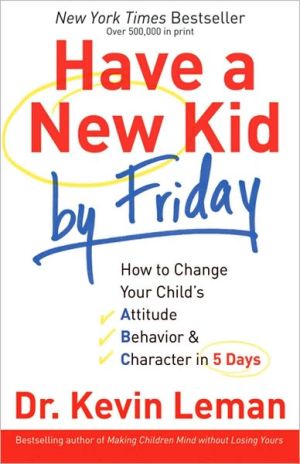Have a New Kid by Friday: How to Change Your Child's Attitude, Behavior and Character in 5 Days
Dr. Kevin Leman is an internationally known psychologist, radio and television personality, and speaker who has taught and entertained audiences worldwide with his wit and commonsense psychology. He has made house calls for hundreds of radio and television programs, including The View, Today, Oprah, CBS's The Early Show, CNN's American Morning, and LIFE Today with James Robison. He has also served as a contributing family psychologist to Good Morning America.\ A bestselling and award-winning...
Search in google:
Today's kids are unionized, and they've got a game plan to drive you up the wall.But you don't have to let them call the shots.If you picked up this book, you did so for a reason. You'd like to see a few things--or many--change in your house. Have a New Kid by Friday is a game plan guaranteed to work. All it takes is sticking to some simple strategies--strategies any parent can carry out.I'll be blunt. You've got a big job to do and a short window in which to do it. If you believe that you are to be in healthy authority over your child, this book is for you. If you don't, put it down right now and buy another.After you read Have a New Kid by Friday, you'll tell yourself, "I can't wait for my kids to misbehave. I'm ready for them!" I promise.Let the fun begin. . . .
Have a New Kid by Friday How to Change Your Child's Attitude, Behavior and Character in 5 Days \ By Kevin Leman \ Baker Publishing Group Copyright © 2008 Kevin Leman\ All right reserved.\ ISBN: 978-0-8007-1902-9 \ \ \ \ Chapter One Monday \ Where Did They All Come From?\ Why do your kids do what they do ... and continue to do it? Your response has a lot to do with it.\ Four-year-old Matthew was in a bad mood. His mom could tell that as soon as she picked him up from preschool. All he wanted to do was argue with her. Then he delivered the vehement kicker from the backseat as they drove home: "I hate you!"\ If you were his parent, how would you respond?\ You could:\ 1. Let the kid have it with a tongue-lashing of your own.\ 2. Ignore the kid and pretend he doesn't exist.\ 3. Try something new and revolutionary that would nip this kind of behavior in the bud ... for good.\ Which option would you prefer?\ If you responded with a tongue-lashing of your own, both of you would leave that car feeling ugly and out of sorts. And what would be solved in the long run? You'd feel terrible the rest of the day. Your son would go to his room and sulk. One or both of you would eventually end up apologizing (probably you first, since your parental guilt would reign; then, because you would feel bad for losing your temper, you'd probably end up liberally dosing the child with treats).\ If you ignored the kid and pretended he didn't exist, it might work for a while-until he needed something from you. With a 4-year-old, that lasts about 4.9 seconds since there are so many things he can't reach in the house (like the milk in the refrigerator on the top shelf). The problem is, if you don't address the behavior, you'll spend the rest of your day steaming under the surface ... and kicking the dog.\ This mom decided to go out on a limb and do something revolutionary. She was very nervous; she wondered if it would really work. She'd read all the discipline books and tried so many methods. None of the other techniques had worked. And Matthew was ... well, getting to be a brat. She couldn't believe she was actually thinking that about her own child, but it was true.\ She sighed. Desperate times call for desperate measures. But this new technique she'd heard about made so much sense. It had worked for three of her girlfriends. They said all it required was her standing up and being a parent, using consistency and follow-through in her own actions, and not backing down. She knew that would be the hardest part. She was a wuss when it came to Matthew. When he turned those big, blue, teary eyes on her, he always got what he wanted.\ But today things were changing, she determined. She was going to give this new method her best effort. She had to do something. Matthew was driving her crazy. Just last week he'd thrown a temper tantrum in the mall; he'd bitten the neighbor girl when she wouldn't give him a toy of hers that he wanted; and the preschool had told her she needed to do something about Matthew's aggressive behavior toward his classmates.\ Once she and Matthew got in the house, she didn't say a word. She went about her business, putting away the shopping bags from the car. After a few minutes, Matthew wandered into the kitchen. Usually chocolate chip cookies and milk awaited him there. It was his routine after-preschool snack.\ "Mommy, where are my cookies and milk?" he asked, looking at the usual place on the kitchen counter.\ "We're not having cookies and milk today," she said matter-of-factly. Then she turned her back on the child she'd pushed 11 1/2 hours for and walked into another room.\ Did Matthew say to himself, Well, I guess I'll have to do without that today? No, because children are creatures of habit. So what did Matthew do? He followed his mother to the next room.\ "Mommy, I don't understand. We always have cookies and milk after preschool."\ Mom looked him in the eye and said, "Mommy doesn't feel like getting you cookies and milk today." She turned and walked into another room.\ By now, Matthew was like an NFL quarterback on Sunday afternoon-scrambling to get to the goal. He followed his mom into the next room. "But, Mommy, this has never happened before." There was panic in his voice. He was starting to tremble. "I don't understand."\ Mom now knew that Matthew was ready to hear what she had to say. It was the teachable moment: the moment when reality enters the picture and makes an impact on the child's mind and heart. It's the time when a parent has to give her child the straight skinny.\ "We are not having milk and cookies today because Mommy doesn't like the way you talked to me in the car." Again, Mom turned to walk away.\ But before she took three steps, Matthew had a giant meltdown. He ran toward his mother and grabbed her leg (after all, he is part of the ankle-biter battalion). He was crying profusely. "I'm sorry, Mommy! I'm sorry. I shouldn't have said that."\ Time for another wonderful opportunity. The mom accepted Matthew's apology, gave him a hug, and reminded him that she loved him. She also told him how she felt when he talked to her like that. Three minutes later, things were patched up, and she let Matthew out of her embrace. She began again to go about her work.\ What did she hear next from Matthew? "Mommy, can I have my milk and cookies now?"\ It was the moment she feared. She steeled her courage and said calmly, "Honey, I told you no. We are not going to have milk and cookies today."\ Matthew was stunned. He opened his mouth to argue, then walked away sadly.\ Let me ask you: will that little boy think next time before he disses his mother?\ Why Little Buford Misbehaves ... and Gets Away with It\ Why is it these days that so many children tend to diss their parents, to act disrespectfully? Why are so many parents caught in the roles of threatening and cajoling and never getting anywhere? What's going on here?\ Kids do what they do because they've gotten away with it!\ It all comes down to who is really in charge of your family. Is it you or your child? Today's parents often don't act like parents. They are so concerned about being their child's friend, about not wounding their child's psyche, about making sure their child is happy and successful, that they fail in their most important role: to be a parent. They snowplow their child's road in life, smoothing all the bumps so the child never has to be uncomfortable or go out of her way. Why should she? She's used to having things done for her. Mom and Dad have become mere servants, doing the whims of the children, rather than parents, who have the child's long-term best in mind.\ Parents today are also great excuse makers, and they tend to put themselves in blame positions-"I couldn't get her homework done because I had a business dinner"-rather than calling a spade a spade: "My daughter didn't get her homework done because she was too lazy to do it." They spend more time warning and reminding than they do training.\ As a result, today's kids are growing more and more powerful. They're all about "me, me, me" and "gimme." They are held accountable less and less and have fewer responsibilities in the family. To them, family is about not what you can give but what you can get. Fewer children today consider others before themselves because they've never been taught to think that way.\ Every child is a smart little sucker, and he has a predictable strategy. In the daily trial-and-error game designed to get the best of you, he's motivated to win because then you'll do anything he says. That means if he tries something, and it works, he'll try it again. But he'll ramp up the efforts a little. Instead of simply crying when he doesn't get his treat, he'll add a little kicking too. If slamming the door causes you to go trotting after your teenage daughter to hand over the car keys like she wanted, she'll be more dramatic the next time she wants them. Children are masters at manipulation. Don't think they're not manipulating you.\ That's why your child's behavior has everything to do with you. If you allow your child to win, your child's smart enough to try the behavior again next time. Have a New Kid by Friday is designed to give you a whole arsenal of tools to use without shooting your kid down. But it'll also accomplish something else if you follow the principles: it'll help you be the kind of parent you want to be so you can have the kind of child you want.\ These principles work with 4-year-olds, 14-year-olds, and even CEOs of million-dollar companies. Just try them and watch them work. The basic principles may seem hard-edged, and some of you may be squeamish at first. But you came to this book because you want to see changes in your home, and you want to see them fast. Well, I'm that kind of guy. If you want me to hold your hand for 11/2 years while you talk through all your problems over and over but don't really want to do anything to change them, you've got the wrong guy. But if you want to face life square on and do things differently for your entire family's welfare, you've got the right guy. People are astonished at the changes that happen in their homes in just 5 days. Teens have gone from mouthy and rebellious to quiet, respectful, and helpful. Screaming, tantrum-throwing toddlers are now saying "please" and "thank you."\ So give this book a chance. Think about where you'd like to be. I can help you get there.\ Attention, Please\ Did you know that everything your child does is for a reason? This is called in psychologist speak, thanks to Dr. Alfred Adler, the "purposive nature of the behavior." When your child misbehaves, he's doing it to get your attention. All children are attention getters. If your child can't get your attention in positive ways, he'll go after your attention in negative ways. That's because a child's private logic (the inner dialogue that tells him who and what he is and will inform his entire life) is being formed right now. And children naturally think, I only count when people notice me or when other people are serving me. I only count when I dominate, control, and win.\ Here's the good news: what children learn, they can unlearn. Author Anne Ortlund has said, "Children are like wet cement-moldable and impressionable," and she couldn't be more right. Children are malleable-up to a point. But as they grow, their "cement" hardens. That's why the earlier you can start addressing your child's Attitude, Behavior, and Character, the better. (More on this in the "Tuesday" chapter.)\ The problem with training is that it takes time, and parents today don't have time and don't make time. Some kids spend most of their days in what I call "kiddy kennels" (day care), then they spend their late afternoon and evening time in multiple programs: gymnastics, choir, baseball, etc.\ When I used to teach at the University of Arizona, I worked with classes of 300 students-including graduate students, medical doctors, and nurses-in an auditorium. I'd bring in families and problem solve with them. Then I'd ask the students basic questions:\ 1. How do you think this child learned his behavior?\ 2. Why is he misbehaving?\ 3. What are the parents doing about it now? Why doesn't this work?\ 4. How did the parents say they feel about this behavior?\ 5. At what level is this child's behavior-stage 1 (attention getting) or stage 2 (revenge)?\ 6. What do you think these parents should do?\ One family who was struggling with the behavior of their son told me all the activities he was involved in. Other than school, that young man had something every single night of the week, and he was only 10! My advice to the parents was, "Cut the extracurricular activities. All of them. Instead of taking your son to counseling, stay home and spend time together. The behavior you are seeing is because your son wants and needs your attention. He's desperate for your attention. And no coach is going to replace the role you have as parents in the life of your child."\ When your child is acting up or acting out, what is he really saying? "Pay attention to me, please!"\ If you don't pay attention to your child in the right way (we'll talk more about that in the "Thursday" chapter), your child ups the ante to the next level: revenge. "I feel hurt by life, so I have a right to strike out at others, including you." If your child is at this level, you really need this book. Many children who proceed to the revenge stage are headed toward the beginning of a rap sheet.\ Power Struggles\ When you choose to do battle with your children, you'll never win. You have much more to lose than they do. Your teenage daughter couldn't care less if her shirt is too tight, but you care, and she knows it. So what is she implying as she flounces down the stairs, dramatically crosses the kitchen, and bounces out of the door with a backward look? "I dare you to say anything!"\ You'll never win in a power struggle, so don't go there. Instead I'll teach you a different way, a better way. A way in which you can establish your authority in the home.\ Creatures of Habit\ There was a classic study done in which researchers conditioned pigeons to peck 3 times in order to receive their reward, a pellet of food. Then, after the birds were trained, the researchers changed the reinforcement schedule. Birds got a pellet every 97 pecks, then every 140 pecks, then every 14 pecks. Those pigeons were so confused, they didn't know what to do. They had learned their behavior so well that they continued, day after day, to peck 3 times to get their food.\ Children, like pigeons, are creatures of habit. If you don't believe that statement, just try leaving out one thing in your bedtime routine as you're tucking your child in. Listen to what happens: "Uh, Mommy, you forgot to rub my cheek. You always rub my cheek." Remember Matthew, who was used to the routine of milk and cookies after preschool? It was only when his routine was broken that he was ready to listen to his mother and learn to behave differently.\ Children learn a behavior, then keep pecking at it to get their reward. That's why those of you who have younger children will have an easier time-your pigeons have had less time to peck for the reward. If you have a child 12 years old or older, he has had a lot more time to peck for those pellets. It will require more effort on your part. But you can still do it by Friday if you stick to your guns. If you want your child to be responsible, I'll show you how to get there. If you want him to be teachable and listen, I'll show you how to get there. It's what you both deserve.\ So how do you effect change in your relationship with your child? You retrain your pigeon. You use consistency and follow-through to make your point, never wavering from the goal.\ How Does It Work?\ Let's say your child wants McDonald's at the mall, but you don't have money for McDonald's. He pitches an all-out flailing temper tantrum, and you're terribly embarrassed. What do you do?\ "Mark, we're not getting McDonald's."\ Then you turn your back on your child and walk away.\ "But, Dr. Leman, wait right there," some of you are saying. "You don't mean you should leave a 6-year-old alone at a mall, do you? How could you just walk away?"\ Ah, but here's the key. Your child doesn't want you to go away. He won't allow you to get very far. He just wants to do battle with you. He wants to win.\ As soon as that child takes a look at your retreating back in the crowd, all of a sudden his fit isn't so fun anymore. Winning the battle isn't so important anymore. Finding and following Mommy-his safety zone-is.\ Let's say you see your 3-year-old purposefully knock over his 18-month-old sister, who's just learning how to walk. Are you angry? Of course. That was downright mean, and you're not going to stand for it. Not to mention the fact that 18-month-old Caroline is now crying. But first you take a breath and think through your strategy. Then you call Andy over to you.\ "Andy, do you need some attention today? If you need a hug, all you have to do is say so. Just come on over and ask me for a hug. You don't have to push your sister over to get it. That kind of behavior is not acceptable."\ You took the fun out of that behavior by naming the purposive nature of the behavior for the child. By doing so, the child knows that you know exactly what happened and why he did what he did. You're the one in control, not him. He doesn't have a reason to do it the next time.\ Let's say your teenager throws you some choice words because you're having chicken for dinner-again-and she says she hates chicken (even though a week ago she asked to have it). When it's time for her to go to Miranda's to "study," you say, "We're not going to Miranda's." Then you turn your back, walk away into the next room, and start folding clothes.\ Just like that 4-year-old who wanted his milk and cookies, your 14-year-old will pursue you. "What do you mean we're not going to Miranda's? You always take me to Miranda's on Tuesdays."\ (Continues...)\ \ \ \ Excerpted from Have a New Kid by Friday by Kevin Leman Copyright © 2008 by Kevin Leman. Excerpted by permission.\ All rights reserved. No part of this excerpt may be reproduced or reprinted without permission in writing from the publisher.\ Excerpts are provided by Dial-A-Book Inc. solely for the personal use of visitors to this web site.\
Acknowledgments 13Introduction: They're Unionized ... and Growing Stronger 15Monday: Where Did They All Come From? 23Tuesday: Disarming the Dude (or Dudette) with the 'Tude 37Wednesday: Show Me a Mean Teacher, and I'll Show You a Good One (It's All in the Perspective) 53Thursday: But What If I Damage Their Psyche? (Uh ... What's a Psyche?) 67Friday: The Doc Is In ... and It's You 79Ash Dr. Leman: A to Z Game Plans That Really WorkShh! It's a Secret! 93Epilogue: Fun Day 275The Top Ten Countdown to Having a New Kid by Friday 289Notes 291Index of A to Z Topics 293About Dr. Kevin Leman 297Resources Dr. Kevin Leman 299








